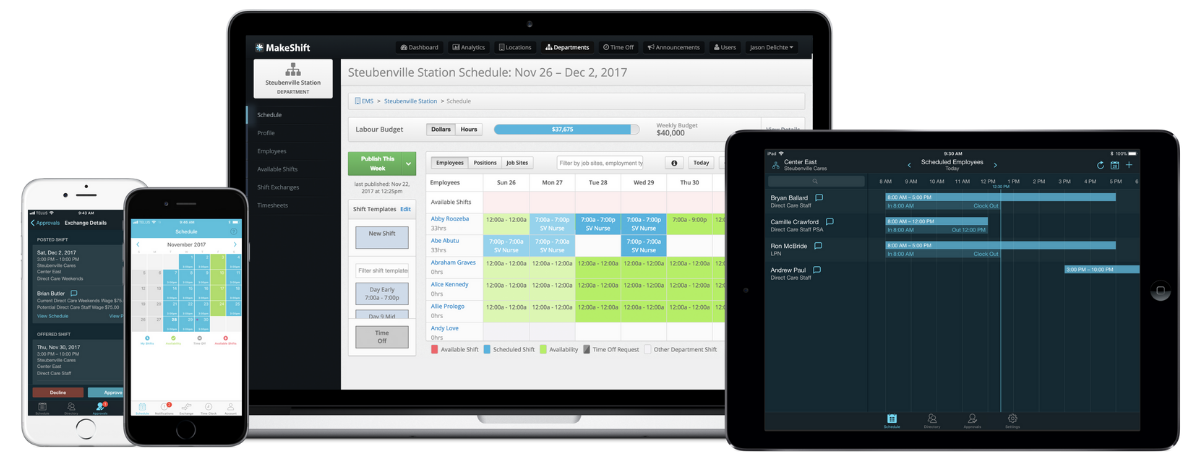Ah, the life of a night shift nurse.
They eat breakfast at sunset and lunch at 2 AM. Their circadian rhythm marches to the beat of a different drummer — literally.
The nocturnal side of nursing has challenges as unique as the hours are unconventional.
From the battle against the body's natural sleep-wake cycle to the quest for a semblance of work-life balance, night shift nurses navigate a world that's anything but ordinary.
And while the struggle is real, there are plenty of strategies to help night shift nurses stay healthy, balanced, and enjoy their jobs. Today, we’ll cover ways to support the night shift nurses on and off the job.
- 6 Challenges of Working as a Night Shift Nurse
- The Benefits of Being a Night Shift Nurse
- How to Help Night Shift Nurses Thrive
- How MakeShift Meets the Needs of Night Shift Nurses
6 Challenges of Working as a Night Shift Nurse
Working as a night shift nurse comes with unique challenges that can impact both personal well-being and professional performance.
From disrupting natural circadian rhythms to juggling their personal life, night shift nurses face obstacles that require resilience and adaptation.
Let’s look at 6 key challenges that night shift Nightingales run into, shedding light on the complexities of working when the rest of the world sleeps.
1. Disruption of Circadian Rhythms
Circadian rhythms reflect years of humans working during the day and sleeping at night. When you work the night shift, you’re disrupting this rhythm, which can have ramifications.
- Impact on Physical Health — Night shift work disrupts the body's natural circadian rhythms and can lead to various health issues.
Nurses working night shifts report a 23% higher rate of obesity due to circadian rhythm disruption.
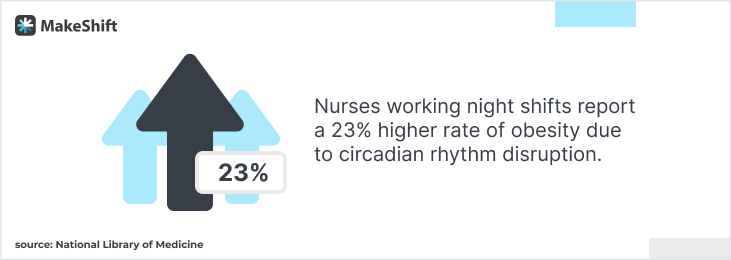
- Sleep Disturbances — Night shift work often leads to irregular sleep patterns and insomnia, affecting overall sleep quality. Chronic sleep deprivation can impair cognitive functions and your physical health.
- Digestive Issues — Disruption in circadian rhythms can lead to gastrointestinal problems like:
- Indigestion
- Constipation
- Acid Reflux
- Stomach Ulcers
- Weakened Immune System — Altered sleep patterns and circadian disruption can weaken the immune system, making night shift nurses more susceptible to infections and illnesses.
This increased vulnerability can lead to higher absenteeism and unsafe nurse-to-patient ratios. - Impact on Mental Health — Disruption of circadian rhythms in night shift nurses is linked to higher instances of emotional distress and mental health disorders. Night shift nurses are 25% more likely to experience mood disorders than nurses working day shifts.
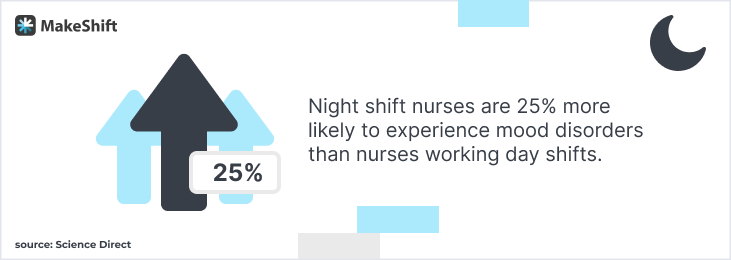
- Increased Risk of Depression & Anxiety — Night shift nurses are 462% more likely to suffer from depressive symptoms than day shift nurses.
The disruption of natural sleep patterns and the stress of working in a high-pressure environment significantly contribute to depression and anxiety. - Cognitive Impairment — Long-term night shift work has been associated with cognitive impairment affecting:
- Focus
- Memory
- Flexible thinking
- Self-control
This impacts the ability to make decisions, solve problems, and provide safe patient care.
2. Higher Risk of Fatigue & Burnout
We all know nursing is a demanding profession with a high risk of fatigue and burnout.
Add in working nights when there’s typically less support staff (fewer aids, administrators, Lift Assist Team…etc.), and the risk escalates.
Extended night shift work can increase fatigue, affecting mental and physical health.
Roughly 60% of night shift nurses experience burnout, significantly higher than nurses on the day shift.
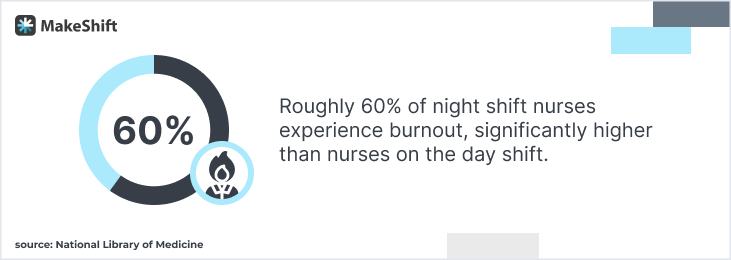
3. Balancing Social & Personal Life
Balancing your personal life can be tricky if you work nights and need to sleep, as we humans do.
Due to conflicting schedules, night shift work can strain personal relationships and your social life. This misalignment can make planning activities or spending quality time with loved ones a logistical nightmare.
The need to sleep during the day also restricts participation in daytime events like kids’ school functions or community events, further complicating work-life balance.
4. Isolation & Social Challenges: FOMO
The Fear of Missing Out (FOMO) is real for many night shift nurses — they may feel disconnected because they have to sleep during the day.
Nurses who work the night shift may experience a sense of personal and professional isolation. They might miss out on team meetings, training sessions, or social interactions with coworkers during the day.
Below are 3 examples of social opportunities where night shift nurses must choose between missing out or ditching sleep.
1. Family Meals & Get-Togethers — Night shift nurses often miss out on family breakfasts, lunches, or dinners, which are prime times for bonding and catching up.
2. School Events — Parents working night shifts find it challenging to attend their children's school functions, like parent-teacher conferences, school plays, or sports events, which typically occur during the day.
3. Community Activities — Daytime community events like festivals, markets, or the local softball league offer social interaction and relaxation opportunities.
Nurses who frequently work the night shift have to forego these activities because of their sleeping schedules.
5. Workload & Staffing Issues
Night shifts often have fewer staff members, leading to an increased workload for those on duty, resulting in overworked employees.
Often, the nurse-to-patient ratio is higher at night. This can be particularly challenging when unexpected medical emergencies arise, requiring quick decision-making and action.
6. Limited Resources
Access to specific hospital resources, including administrative support and some diagnostic services, may be limited or unavailable during night shifts.
Night nurses often have to be more resourceful and autonomous in handling situations, which can be emotionally draining over time.
The Benefits of Being a Night Shift Nurse
This section is for the night owls. Those that get their 2nd wind at 1 am and don’t mind catching zzz’s during the day. They’ve never really been a morning person anyway.
If you’re a nurse who loves nighttime vibes, these benefits make working the night shift even more appealing.
Higher Earning Potential with Shift Differentials
Let’s talk money — it can pay off to work the night shift. Night nurses often get:
- Increased Pay Rates — Night shift nurses often receive higher pay due to shift differentials, compensating for the unconventional hours.
- Financial Savings — Indirect savings on childcare expenses can improve financial stability.
Opportunities for Career Advancement & Professional Development
Working as a night shift nurse opens the door to development opportunities that might be less readily available on the day shift. For example:
- Skill Enhancement — Night shifts provide unique challenges that enhance clinical and problem-solving skills.
- Leadership Opportunities — Night shift nurses often take on more leadership and mentoring roles with fewer staff on duty.
- Professional Recognition — Demonstrating the ability to handle the demands of night shift work can lead to greater recognition and career advancement opportunities.
Less Commute Time & Traffic Congestion During Off-Peak Hours
Depending on when your shift at the hospital begins and ends, you can steer clear of heavy traffic and long lines AND spend less time in your car. This means:
- Shorter Travel Time — Traveling to and from work during off-peak hours usually means less traffic and a quicker commute.
- Lower Stress Commuting — Avoiding rush hour traffic can lead to a more relaxed and less stressful commute.
- Flexibility in Errands & Appointments — The ability to schedule appointments or run errands during less busy daytime hours lets you skip crowds and long waits.
Other Benefits:
- Quieter Work Environment — Night shifts are often less hectic than day shifts, allowing for a more focused work environment. The day shift brings a steady flow of doctors, therapists, and visitors.
- Enhanced Autonomy — Night shift nurses frequently have more autonomy and opportunities to develop critical thinking and decision-making skills.
- Stronger Team Cohesion — Working with a smaller staff can lead to closer relationships and stronger team unity.
How to Help Night Shift Nurses Thrive
Night shift nurses need to feel supported to enjoy working the night shift. It’s usually harder to fill the night shifts, so creating a supportive culture is vital to help night nurses thrive at work and in life.
Nurses who feel their well-being is a priority are more likely to stick around, increasing your retention.
5 Strategies to Create Balance for Night Shift Nurses
Are you a night shift nurse? Try these strategies to move past surviving and on to thriving while working nights.
1. Optimize Sleep & Rest — Create a conducive sleep environment and keep to a consistent sleep schedule, even on days off.
- Cover your windows or use blackout curtains
- Turn off your phone
- Hang a sign on your front door

2. Nutrition & Hydration — Eat balanced meals, stay hydrated, and manage caffeine intake. Be aware of possible Vitamin D deficiencies from limited access to daylight — you may need to take supplements to counteract this.
Remember, just because you work the night shift doesn’t mean you’re destined to rely on coffee and energy drinks to stay awake.
Caffeine alternatives for an energy boost:
- Vitamin B deficiencies contribute to mood problems, fatigue, and poor concentration. Eat vitamin B-rich foods like lean meats, nuts, seeds, and grains.
- Peppermint tea is not only refreshing. Studies show it supports exercise performance & brain oxygen concentration.
- Take Ginseng. It helps memory and endurance, as well as enhances concentration.
3. Physical Activity & Wellness — Prioritize regular exercise. Try light stretching or a quick walk during your breaks and stress-reduction techniques like meditation or yoga.
4. Maintain Social & Family Connections — Stay connected with your loved ones and participate in social activities that fit your night shift schedule. Take advantage of technology to make staying connected easier — use video calls to stay in touch.
5. Pursue Personal Interests — You are more than a creature of the night. Take up a hobby you enjoy during off-hours, fostering a sense of fulfillment outside work.
8 Strategies for Managers Supporting Night Shift Nurses
These strategies will help you support your night nurses’ well-being both on and off the job.
- Promote a Culture of Inclusion — Foster an environment where the unique needs of night shift nurses are recognized and supported by management and peers. Host nighttime versions of events you put on during the day to include your night nurses.
- Encourage Work-Life Balance — Advocate for regular breaks and time off to help nurses balance their professional and personal lives.
- Facilitate Peer Support — Encourage the development of a support network among night shift nurses for sharing experiences, tips, and advice.
- Flexible & Fair Scheduling — Implement self-scheduling systems or rotating shifts to head off burnout. Allow nurses to choose their schedules and set their availability to balance personal commitments.
Staff scheduling software makes interactive scheduling more accessible and streamlined. - Work Environment & Resources — Ensure adequate staffing, provide a comfortable break room, and offer access to workout facilities. If your hospital has a gym, extend hours to accommodate your night shift workers. Ensure night nurses have access to the necessary resources to do their job.
Add comfortable furniture and healthy snacks to make your break room feel like an actual “break.” - Professional Development & Career Growth — Facilitate training and career advancement opportunities accessible to your night staff. Encourage participation in workshops and seminars.
Offer self-paced online training modules to accommodate the night shift. - Recognition & Rewards — Develop recognition programs or incentives to acknowledge the unique challenges of night shifts. Provide regular feedback and show appreciation to your night nurses.
- Mental Health & Community Building — Offer info on wellness programs, health services, and employee assistance programs. Organize team-building activities and encourage participation in community events.
How MakeShift Meets the Needs of Night Shift Nurses
At MakeShift, we know and understand nurses. In fact, chaotic nursing schedules got us into the scheduling business in the first place.
Our founder’s wife was a nurse whose schedule regularly collided with her personal life. She loved her job, but not having control of or access to her schedule was sucking the enjoyment out of being a nurse.
MakeShift was developed to ease the burden of nursing staff scheduling by taking a people-first approach. Our software makes scheduling more intuitive, smarter, and uber streamlined.
Our features and functionalities meet the specific needs of night shift nurses in several key ways:
Flexible Scheduling- Self-Scheduling Capabilities — Nurses can choose their shifts to balance work with personal life more effectively.
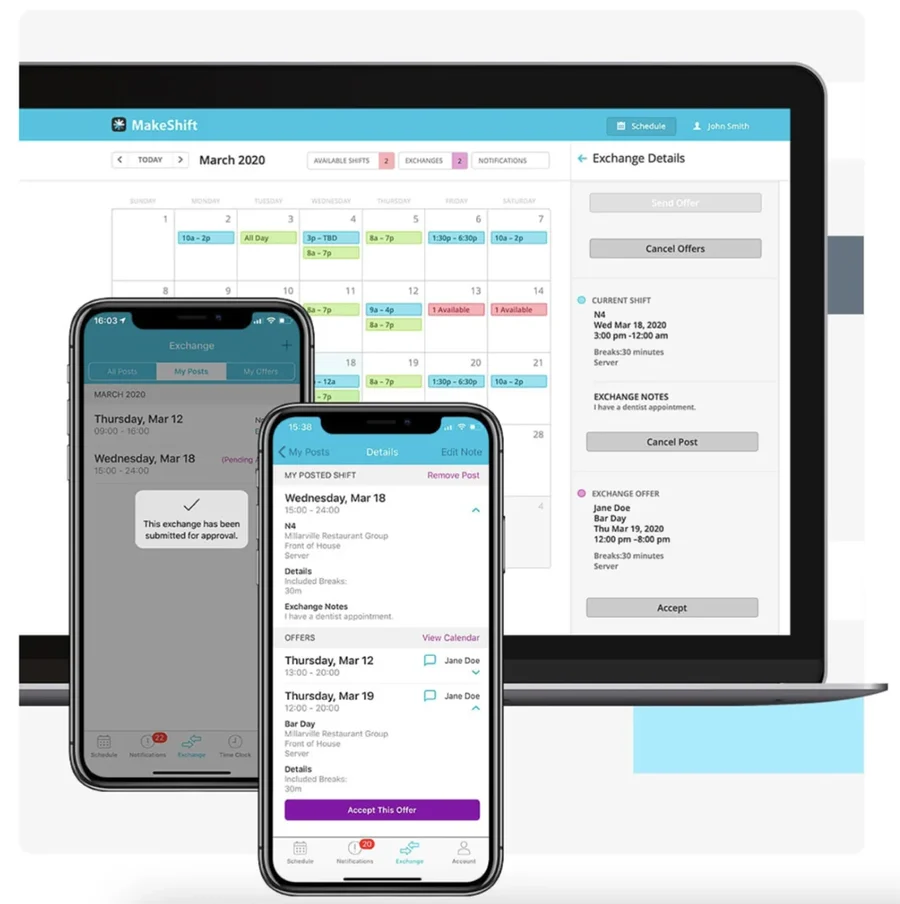
- Shift Swapping — Nurses can swap shifts with colleagues easily, offering greater control over their schedules.
This flexibility is crucial for night shift nurses who may need to adjust their schedules due to sleep patterns or personal commitments.
Real-Time Communication
- Instant Updates & Notifications — MakeShift provides real-time updates on schedule changes, ensuring night shift nurses are always informed on who’s working when.
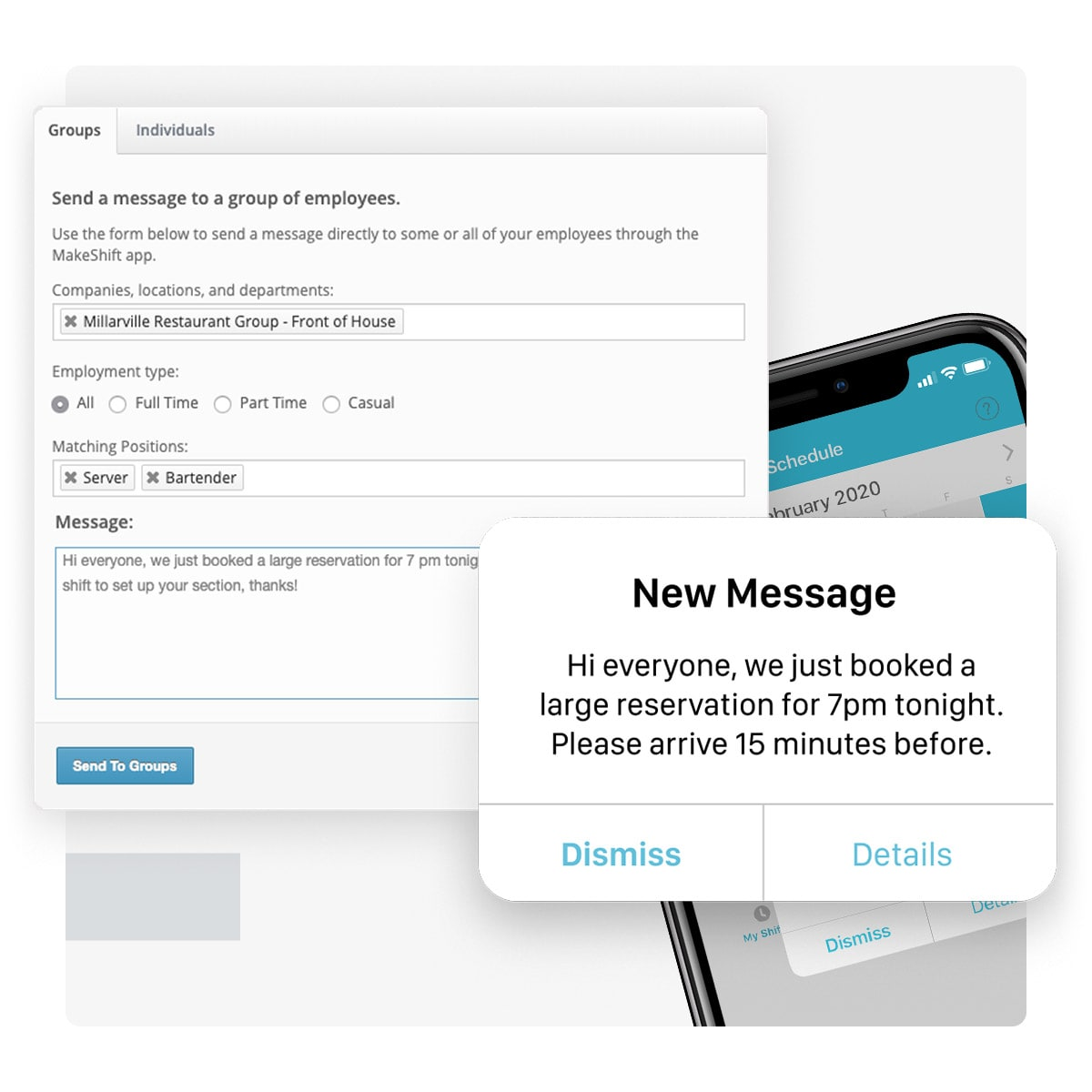
- Practical Communication Tools — The platform facilitates direct communication between nurses and managers, making addressing concerns or requests specific to night shift work easier.
Health and Well-being Focus
- Balanced Shift Allocation — MakeShift helps distribute night shifts among nurses evenly, preventing burnout and overwork. It can be set to ensure fair rotation, giving each nurse adequate time to recover between night shifts.
Wellness Integration

- AI-Powered Platform — ShiftMate AI offers scheduling suggestions to ensure staff get balanced schedules and adequate time off.
Long-Term Scheduling
- Advanced Shift Planning — Nurses can view and plan their shifts well in advance, aiding in long-term personal and professional planning.This feature is handy for night shift nurses who need to coordinate their unique sleep and rest patterns with work.
Accessibility

- Mobile Access — With mobile app support, night shift nurses can access their schedules anytime and anywhere, which is essential for those working unconventional hours.
This accessibility ensures they can manage and view their schedules outside the typical 9-to-5 window.
Planning and Support Can Help Night Shift Nurses Flourish
Regularly working the night shift can feel like you’re living life upside down. But, with support and proactive steps to protect well-being, your night nurses can live a balanced life.
Encourage them to take good care of themselves and offer plenty of accommodations to include them in development programs. Let them know you appreciate them and the unique challenges they face on the daily.
At MakeShift, we’re committed to offering smart, accessible scheduling to make your nurses’ lives simpler. Ready to see for yourself? Schedule a FREE demo today.




